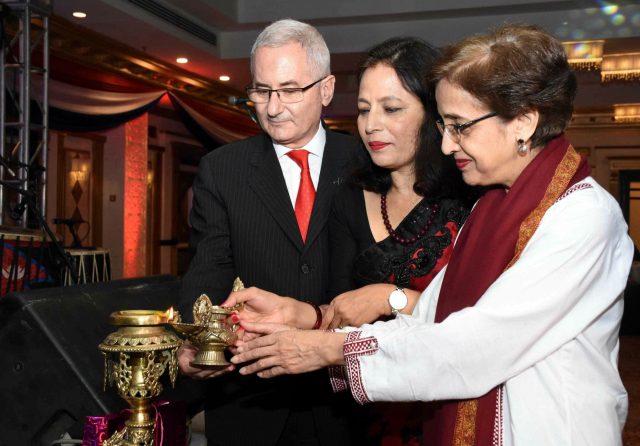
Ms. Sewa Lamsal, ambassador of Nepal and Mr. Maurizio
Romani, General Manager, Islamabad Marriott Hotel hosted a reception in the
Federal Capital to celebrate 60th anniversary of the establishment of
diplomatic relations between Nepal and Pakistan. It was a distinct event by all
standards. A large number of guests graced the reception who were honorably
seated at nicely laid round dining tables. Delicious traditional Nepali cuisine
was served to the guests. Folk music was another highlight of the festivity.
The guests included diplomats and prominent people from various segments of
Pakistani society.
National anthems of Pakistan and Nepal were played to the loud applause of the
gathering. Foreign Secretary Tehmina Janjua was the chief guest on the
occasion. She was quite eloquent while she reviewed the friendly relations
between Nepal and her country. She said, the cordial relations between the two
countries had been growing steadily over the past 60 years, gaining more and
more depth and heights. She was of the view that there were vast possibilities
of greater cooperation between the two countries in various fields. The
ambassador of Nepal in her speech was all praise for friendly sentiments that
existed not only in the government circles but also in the hearts of Pakistani
people for their Nepali brethren.
The Embassy of Nepal was established in Islamabad in 1967. Besides host country
Pakistan, this Embassy is concurrently accredited to six other countries Iran,
Kyrgyzstan, Tajikistan, Turkey, Turkmenistan and Uzbekistan. The promoting
friendly relations between Nepal and Pakistan and other accredited countries in
the economic, cultural and scientific areas.
The bilateral relations between the two countries are based on goodwill, mutual
cooperation and friendship. Pakistan and Nepal hold similar views on many
issues of common interests and work closely at various international and
regional forums such as the UN, NAM, and SAARC.
Pakistani investors have entered into joint ventures with their Nepali
counterparts in textile, hotels and banking in Nepal. Nepal and Pakistan have
great potential of bilateral trade. Nepal’s export to Pakistan mainly includes
black tea, woollen shawls, leather, hide and skin, optical lenses, medicinal
herbs lentil and cardamom. Nepal’s import from Pakistan consists of refined
leather, machinery and parts, shoes and sandals, spices, poppy seeds, medicines
and medical equipment, dried fruits, plastic lab equipment, textiles,
accumulators, carding machines and appliances.
Pakistan, under the Pakistan Technical Assistance Programme (PTAP), provides
annually scholarships to Nepalese students in Medicine, Pharmacy and
Engineering. There are more than 500 Nepali students undertaking higher studies
in the field of medical science, engineering, pharmacy, information technology,
social science, management, and mass communication in Pakistan. Pakistan
provides long and short term trainings to the government officials of Nepal.
Nepal and Pakistan signed the Cultural Agreement in May 1970 which aims at
promoting cultural relations, establishing inter-universities relations, and
cooperation between Radio and Television. Nepal-Pakistan Friendship and
Cultural Association in Kathmandu and Nepal Friendship Group in Islamabad are
actively working to promote bilateral cooperation between the two countries.
Pakistan and Nepal help each other in need. After the devastating earthquake of
April 2015, the Government of Pakistan sent immediate assistance to Nepal. It dispatched
rescue and relief teams, food, water, tents and other relief material. Pakistan
took part in the International Conference on Nepal’s Reconstruction and pledged
support to Nepal.
Nepal takes pride in its long history and cultural legacy dating back to
ancient times. It has been abode of Buddha civilization. In modern age, after
many years of struggle Nepal witnessed a People’s Movement in 1990 paving the
way to democracy.
The culture of Nepal is rich and unique. The cultural heritage of Nepal has evolved
over the centuries. This multi-dimensional heritage encompasses the diversities
of Nepal’s ethnic, tribal, and social groups, and it manifests in music and
dance; art and craft; folklore and folktales; languages and literature;
philosophy and religion; festivals and celebrations, foods and drinks.
Tourism is one of the mainstay of Nepalese economy. It is also a major source
of foreign exchange and revenue. Possessing 8 of the 10 highest mountains in
the world, Nepal is a hotspot destination for mountaineers, rock climbers and
people seeking adventures. The Hindu, Buddhist and other cultural heritage
sites of Nepal, and fair weather are strong attractions. Nepal is the country
of the Mount Everest, the highest mountain peak in the world, and the Birthplace
of Gautama Buddha. Hundreds of thousands foreign tourists throng Nepal every
year.
Curtesy Pakistan Observer

